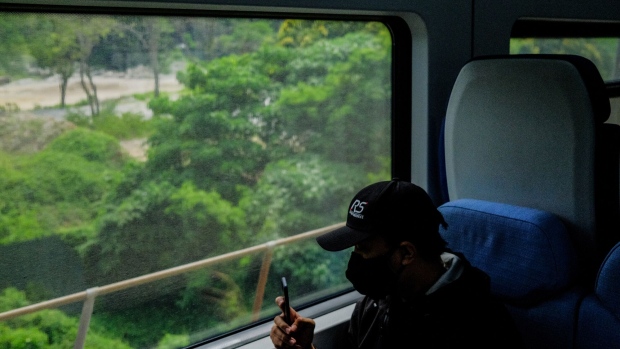Jun 2, 2023
Malaysia Stays Open to Chinese Firms in 5G Network Rollout
, Bloomberg News

(Bloomberg) -- Malaysia will remain a free market and allow mobile-phone carriers to decide whether to work with Chinese equipment makers including Huawei Technologies Co. during the rollout of the second 5G network, said Communications Minister Fahmi Fadzil.
“The government itself is not entering into any contractual obligations with any of these network equipment providers,” he said in an interview with Bloomberg News on Thursday. It’s a commercial decision, and “the ones who need to be convinced are the telecommunication companies, the mobile network operators,” he said from his office in Kuala Lumpur.
Still, the government will take into consideration concerns voiced by some Western countries over Huawei’s possible participation in the network, he said. The US and UK, among others, have shunned Huawei equipment and alleged it poses a national security risk due to the company’s potential links with the Chinese government — Huawei has rejected those claims as unfounded.
Malaysia plans to deploy a second 5G network from as early as January, following a months-long official review of the existing network run solely by the state-owned Digital Nasional Bhd. The plan attracted lobbying attempts from Huawei to secure contracts, prompting the US and EU to warn Malaysia of security risks, according to the Financial Times.
Prime Minister Anwar Ibrahim’s government has repeatedly said the contracts to build the second network will be awarded through an open tender process.
Fahmi said his ministry was also looking into strengthening existing laws on mobile network operators and the quality of services they provided. The proposals may be brought to parliament by the middle of 2024, he said.
“It’s not about just coverage, it’s about how consistently you get good coverage,” he said. The 4G network has reached almost 97% of operated areas in Malaysia, and yet no single operator on its own has achieved that coverage, Fahmi said.
Social Media Regulation
Fahmi added that the proposed amendments may also address weaknesses in “ensuring regulatory compliance” from social media platforms, particularly in matters of hate speech and incendiary content.
A recent study led by the Centre for Independent Journalism found that “online users employed divisive language and hate-based narratives around race, religion and royalty” in the runup to Malaysia’s general election in November last year.
“After election day, content created by young TikTok users to manufacture fear went viral and had high cross-platform amplification. Content on race frequently intersected the religion,” according to the report.
The election resulted in a hung parliament, with Islamist party PAS winning the most number of seats. PAS president Abdul Hadi Awang and his party were the biggest amplifiers of race issues, the study found. Anwar was eventually named prime minister after receiving the support of former rivals to form a new government.
Fahmi said on Thursday the government was taking steps to prevent such content from proliferating on social media ahead of six state elections due this year. His ministry was engaging with platforms including Twitter, Telegram, ByteDance Ltd.’s TikTok and Meta Platforms Inc.’s Facebook and Instagram on the matter.
“So far I can say that TikTok, Meta have been very cooperative in terms of engaging with the MCMC,” said Fahmi, referring to the Malaysian Communications and Multimedia Commission. “And we hope to continue with the good working relationship with most of these social media platforms.”
--With assistance from Ravil Shirodkar.
©2023 Bloomberg L.P.





